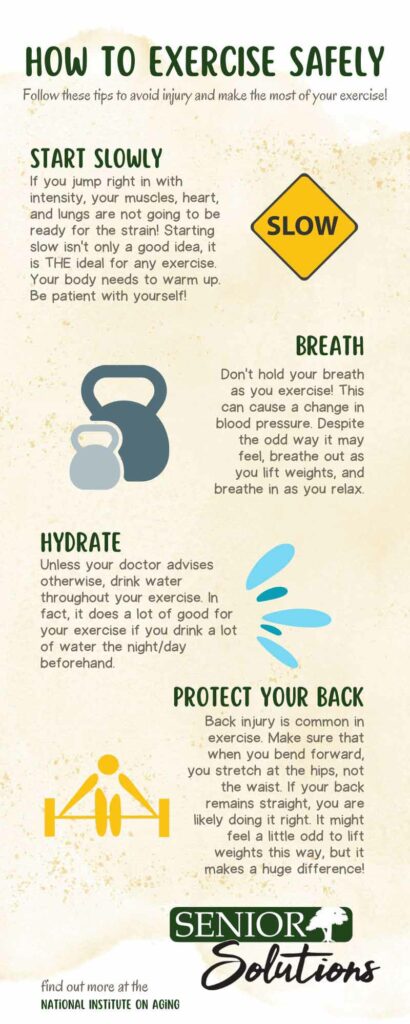It’s no secret that living a healthy lifestyle leads to a higher level of happiness. This is also true with seniors! When the elderly live a healthy and balanced life, it can decrease their chance of cognitive impairment or diseases like Alzheimer’s and dementia. How do you do this?
To reduce the chance of cognitive decline in seniors, 5 things should be done: exercising, healthy eating, avoiding high blood pressure, mental stimulation, and regular socializing. Doing this will improve brain health in aging adults and reduce the symptoms of cognitive impairment.
To get more details on how to add this to a senior’s daily routine and how Senior Solutions can help you, continue reading below!
1. Exercise
There are plenty of benefits for seniors who exercise. Not only does it improve their strength and balance, but regular exercise puts anyone in a better mood.
Balance aside, exercise can assist aging adults with their memory. In one study of 3,000 participants, seniors who exercised 3 times a week for 4 months could recall personal experiences more easily than those who did not.
Daily exercise can also prevent heart disease, colon cancer, breast cancer, and type 2 diabetes.
Because everyone’s schedule and health needs are so different, exercise can look different for everyone.
Ideas include:
- Morning walks with friends
- Water aerobics class
- Chair yoga class
- Resistance band workouts
- Dancing with grandkids
When exercising, always make sure to stretch your muscles before starting your workout. This can be done in bed and first thing in the morning. Gentle activities like walking, washing dishes, and chair exercises can be beneficial for seniors with mobility issues.
2. Healthy Eating
Changing your diet can seem like a daunting task, but when you break it down into little steps, it becomes much easier. Avoid foods with added sugar, saturated fats, and sodium. Eat a variety of food that has protein and essential vitamins like vitamin B12.
You can add sliced vegetables and fruits as a snack throughout the day. Drinking lemon juice or seasoning foods with citrus and herbs can help reduce sodium. Finally, staying hydrated can help aid digestion.

3. Manage Blood Pressure
High blood pressure is known as the “silent killer” because many who have it feel completely normal. Blood pressure is when blood pushes against your arteries, and when the pressure is high, your arteries go stiff. This can increase the risk of having dementia and cognitive impairment.
Lifestyle changes can help reduce the risk of high blood pressure, but in more serious cases it needs to be treated with medication. High blood pressure doesn’t have any symptoms that seem severe, so it is best to do routine check-ups.
Some symptoms are:
- Moderate to severe headaches
- Anxiety and shortness of breath
- Feeling pulsations
- Symptoms have been present for months at a time
Those at risk are:
- People who have a history of high blood pressure in their family
- Males under 55 years old
- Women who just experienced menopause
- People with thyroid issues, kidney disease, and metabolic syndrome
You can control your blood pressure by maintaining a healthy weight and exercising. In addition, sleeping well and managing stress effectively can also reduce blood pressure and symptoms of cognitive decline.
4. Exercise The Mind
While it’s important to keep your body moving, it’s just as important to keep your mind active. One study found that aging adults in their 70s and 80s who did activities such as reading, writing, puzzles, and writing cards were half as likely to develop mild cognitive impairments than those who did not participate in activities.
Some seniors, like Idaho Falls local Jeff Merrill, have found new hobbies to help the community. Jeff learned how to transfer old photos and videos to a digital format, giving families access to their old memories.
Learning is a lifelong journey that doesn’t end with a degree. For those in the Eastern Idaho area, click here to see resources for senior citizens from Idaho State University.

5. Stay Connected
Whether it’s with family members or friends, staying connected socially will significantly decrease your risk for cognitive impairment.
In 2008, one senior named Stella had been struggling with dementia. After showing signs of cognitive impairment, she moved to a senior residence that was closer to her family. In one month, Stella was now socializing, walking three miles every day, and her signs of cognitive impairment decreased significantly!
Although Stella’s story is not always normal, new research gives hope to families who have aging loved ones with cognitive decline. Doctors now argue that close relationships and social groups are key to preventing Alzheimer’s and dementia.
How Can We Help?
Senior Solutions is a helpful resource for East Idaho Senior Citizens. Whether you need help finding care support or just want to learn what resources exist to help in your aging journey, we can help!
Call us at (208) 821-0955, email us, or use our contact form to get started!


